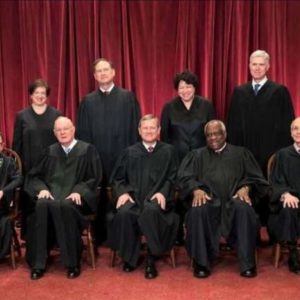The first Monday of every October features a majestic ritual in our nation’s capital. Nine of the most powerful lawyers in America ascend the bench of the U.S. Supreme Court, led by the Chief Justice of the United States, where they hear the first oral arguments of the new term.
As a member of the Supreme Court Bar, I get goosebumps every time I can sit in that courtroom of marble and red velvet, and listen to learned advocates grapple with the justices over issues large and small. Watching those arguments is a privilege that I never take for granted. Make no mistake, however, it is a privilege, because the Supreme Court provides no live video or audio feed of its proceedings for the benefit of the general public who cannot be in the court.
Let me explain. The Supreme Court divides those who want to see an oral argument into two groups: Those who are members of the Supreme Court Bar, and everybody else. In this way, while the glorious motto engraved on the architrave above the court’s front entrance reads, “Equal Justice Under Law,” there is not Equal Access By All to witness the court’s proceedings.
Members of the Supreme Court Bar are lawyers who meet a handful of requirements and pay a fee. When we want to watch a Supreme Court oral argument, we get into the court building by a side entrance, and are given a number according to our place in line. If the case isn’t a high-profile one, Bar members usually get a seat inside the court without too much trouble. If there is substantial interest in a case, however, there may not be enough space inside the courtroom to accommodate all Bar members. In that event, we can listen to the oral argument piped in over speakers in an overflow room called the “lawyers’ lounge,” like listening to the radio.
Court proceedings begin at 10 a.m., and for most cases Bar members can arrive as late as 9:30 to at least get into the lawyers’ lounge. While it may have happened in the past, I am not aware of a single time in recent decades that the court could not accommodate all members of the Supreme Court Bar who wanted to watch or listen to an argument, either in the courtroom or the lawyers’ lounge — and that includes blockbuster arguments over marriage equality and the Affordable Care Act.
The public, however, gets no such special treatment.
Non-Bar members have to wait in a separate, “public line” on the sidewalk out in front of the court. When should one be in the public line to get a seat in the court? The safest advice is to get there early. For the court’s historic oral argument in the marriage equality case in 2013, the public lined up before 5 p.m. the day before. The same was true for the oral argument in the D.C. gun case back in 2008. There are several other similar examples.
How many people in the public line will get a seat to watch a given argument? Unfortunately, it varies, but probably in the neighborhood of 60 people in the public line will be permitted to watch a full argument — sometimes more are allowed in, other times fewer — out of potentially hundreds waiting. People have waited for hours, often in the cold and rain, only to be denied a seat in the court. Instead, they are gathered in groups, and permitted to watch proceedings at the back of the court, standing for about three minutes, until they are shuttled out and a new group from the public line is allowed in for another three minutes.
Is this really the best the court can do in 2018?
Television has been around for more than 90 years. Radio for more than 100. Why is it only members of the Supreme Court Bar get to watch or listen to an oral argument live, but not the whole American people? Clearly there is no technical reason, neither is there a legal one. If the justices are camera-shy or afraid of oral arguments turning into visual spectacle — objections that, at best, are outweighed by equal access by the people to their government — surely they can at least allow proceedings to be broadcast over the radio, a technology older than the Supreme Court building itself.
Government of, by, and for the people requires nothing less.

